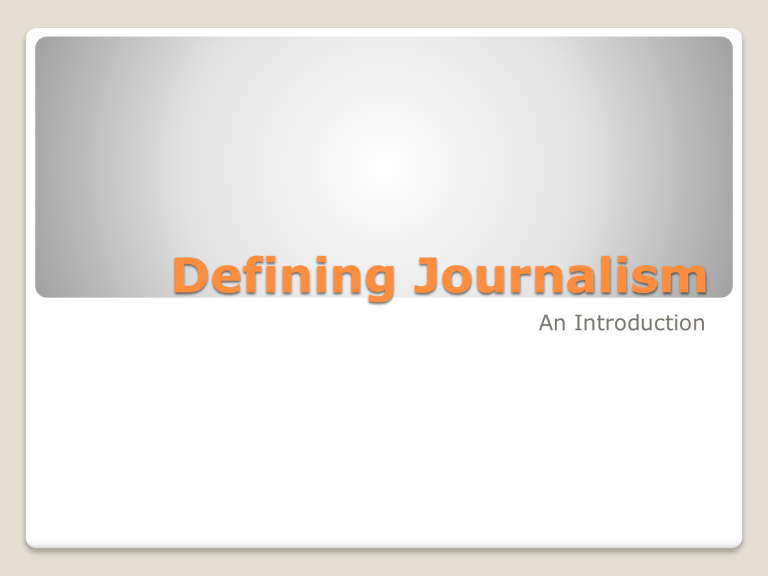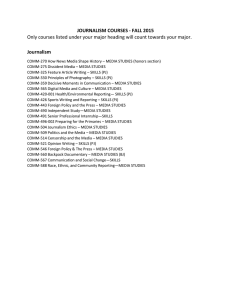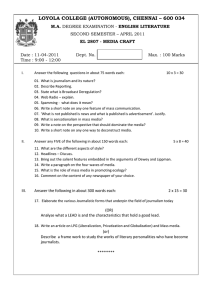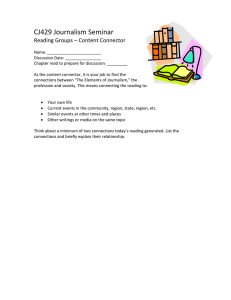
Defining Journalism An Introduction Traditionally Journalism is definied as bringing the news of the day—material of current interest or importance– to an audience. Yet this definition has blurred, at least in the eyes and ears of consumers. What do you think has caused the definition to blur? Journalism-The Challenges As technology (social networks, online RSS feeds) of journalism has diversified, the lines between journalism and gossip, between journalism and entertainment, have narrowed. Journalism At the high school level, journalism is still best approached as the process of reporting and writing the news and packaging it for an audience. Whatever the technology, news is information that must be collected and presented to a consumer. Journalism News—or journalism– is only one part of what is called media. Journalism is not the movies, book publishing, public relations, corporate communications, television sitcoms, radio talk shows, websites (with the exception of newspaper websites), or any other sub divisions of mass communication. Journalism Because journalism results in a product, it can be studied as a discipline. Journalism is a laboratory in which the goal is production by a team, just as it is in the professional press. Journalism Hurricane Issac lashes Gulf coast in a slow Churn Ann Romney, Chris Christie vouch for Mitt’s heart and spine Teen tried for allegedly impersonating a Physician Wynonna resumes tour after husband’s crash Madonna tells America, Enjoy your freedom Katie and Tom finalize their divorce Is Lindsey Lohan too skinny? Kris Kardashian’s love affair, will Bruce forgive her? Lesson 1: Is it news? Roles for a Publication: If you were in charge how would you rank the ten roles for a publication, from the following slides? Journalism 1. 2. News Reporting-to what degree will you report what does on in school—the good, the bad, the past, present, future? What do you consider news? Should you produce anything but news? Entertainment-how important is giving your audience an emotionally rewarding break from academic life, including a focus on the humorous, light side of themselves? If it isn’t serious, can you tell if it is news? Journalism 3. Matter of Record-to what extent will you report all events during the school year so there will be a record of the year for others to look back on? What details are important? To what extent are you producing history? Is journalism history on the run? 4. School Spirit-how responsible are you for stressing the positive and for helping readers see the good side of the school year? Are you a cheerleader, obliged to publicize and promote school life? Journalism 5. Community Image-Is the community beyond your high school campus part of your audience? How important is it to give community residents a positive image of school events? Does it matter what that they, as parents and citizens, think about your school? 6. Educational skills-how important is it for you to learn and practice the professional standards of journalism education? Should the commercial press be your model? Is high school journalism the first step in a career? Journalism 7. Reader Culture-how far should you go in giving your readers and viewers what they want, no matter what it is? Should your journalistic judgment supersede theirs? Will they buy your product if it does? 8. Leadership-to what extent will you show your audience what alternatives and choices might exist to resolve problems and conflicts at your school? To what extent will you try to control or influence their decisions? Journalism 9. Public Forum-How much opportunity will you provide for your audience to express their views, to sound off on whatever they want? Are all topics open to public discussion? 10. Interpretation-To what degree will you try to explain how events, issues, and personalities are tied together and affect student life at your school? Journalism Setting Priorities with Teamwork ◦ While all 10 goals listed have validity, a publication or broadcast staff must generate some agreement on which ones are most important if it’s to develop a consistent product. Otherwise, you’ll confuse your readers. ◦ The way to set priorities is through discussion. ◦ Journalism is a group effort from beginning to end. In the commercial press, journalism requires specialists whose work blends together as the publication or broadcast is produced. At the high school level, journalism is more likely to be the work of generalists, beginners who do a little bit of everything because that’s the best way to learn. ◦ Goals need to be argued on a regular basis—they form the foundation of what you’re going to learn to do. Journalism Here are a few thoughts about the Primary Roles: 1. News Reporting-The difficulty of setting this goal as a high priority is determining what is news. As a journalist you are a gatekeeper-you, not the audience, decide on what news items will be presented. Once you forfeit your right to control access, you stop being a journalist. Journalism-Primary Roles 2. Entertainment-This function has evolved as a strong priority for most forms of journalism-to the dismay of traditionalists who see information and truth as journalism’s most noble goal. Yet news and entertainment have long coincided in the same journalistic medium. The question here is balance. Primary Roles 3. Matter of Record-this journalistic purpose takes highest priority in the yearbook, which by definition, defines the year. Professional papers do this too-notice the detail recorded in the stock market report, score boxes on the sports page, or the weather page. Primary Roles 4. School Spirit-Journalism and promotion are not the same thing, so this priority might be low. You might run into conflict with school officials who would only like you to present the school in a positive light. Other students may see your job as a publicity agent for their activities. Don’t dismiss this goal—learn to understand its importance to others and your school environment. You should also get used to the blaming the messenger element in journalism, in which you get criticized for what you print and don’t print. Primary Roles 5. 6. Community Image-This goal deals with public relations, implying that because adults outside the school may read the newspaper, it should be written with them in mind. You need to prioritize your audience. Educational skills-journalism class, like any other course offered in your school, ought to develop useful skills in those who take it, especially if students are considering journalism as a profession. That is argument for developing as professional an approach as possible for what you are learning. Primary Roles 7. Reader Culture-This is a tempting priority fraught with risks. If your sure your audience is homogeneous, it’s easy to address their tastes, but you might end up with a crossword puzzle magazine or a comic book. Awareness of their needs is good, but it can’t conflict with the other priorities. Primary Roles 8. Leadership-It’s quite easy for the newspaper to have influence on certain areas or on specific issues, but journalists disagree on the importance of this goal. Traditional journalists argue that the press should report the news in a neutral manner and not try to influence decisions. Yet the more active leadership role of the press in influencing public behavior has been clear for quite some time. Primary roles 9. Public Forum-This purpose has legal implications. Getting agreement from the school administration that your publication is, indeed, a public forum is the best way to avoid censorship. 10. Interpretation-this function deserves high priority in all forms of student journalism because it takes the audience beyond the superficial and tries to explain the environment in which they spend so much time. But it is difficult to be consistent with interpretation. Primary Roles Paying your way-generating profit, how will it affect our reader culture? Showcase-providing created students with an outlet for publication can be seen as a role if you put the audience first. Do we support our school events just because they entertain an audience? Yet where would these activities be without an audience? Where would we be without an audience? Other Roles What are our Rights? Amendment I Congress shall make no law respecting an establishment of religion, or prohibiting the free exercise thereof; or abridging the freedom of speech, or of the press; or the right of the people peaceably to assemble, and to petition the Government for a redress of grievances. The First Amendment to the US Constitution as a part of the Bill of Rights In Tinker v. Des Moines Independent Community School District, 393 U.S. 503 (1969), the Supreme Court extended free speech rights to students in school. The case involved several students who were punished for wearing black armbands to protest the Vietnam War. The Supreme Court ruled that the school could not restrict symbolic speech that did not cause undue interruptions of school activities. Justice Abe Fortas wrote, [S]chools may not be enclaves of totalitarianism. School officials do not possess absolute authority over their students. Students...are possessed of fundamental rights which the State must respect, just as they themselves must respect their obligations to the State. However, since 1969 the Supreme Court has placed a number of limitations on Tinker interpretations. In Bethel School District v. Fraser, 478 U.S. 675 (1986), the Court ruled that a student could be punished for his sexual-innuendo-laced speech before a school assembly and, in Hazelwood v. Kuhlmeier, 484 U.S. 260 (1988), the Court found that school newspapers enjoyed fewer First Amendment protections and are subject to school censorship. More recently, in Morse v. Frederick, 551 U.S. 393 (2007) the Court ruled that schools could, consistent with the First Amendment, restrict student speech at school-sponsored events, even events away from school grounds, if students promote "illegal drug use." (summary from wikipedia) School Speech LAWS VS. ETHICS What’s the difference? Ethical issues Student Journalists Face From HSJ.org Conflict of interest: Examples include interviewing friends; only interviewing one grade or those with a specific point of view; "getting even" with those who might have wronged you; doing anything that might compromise objectivity in the reporting of the truth. Plagiarism: Claiming others' work as one's own, essentially stealing from them. Students must credit other people's materials and ideas, including those published in newspapers, magazines and books. This includes "borrowing" or downloading visuals from the Internet to use without permission with stories. Anonymous sources: Although many reporters use anonymous sources, there are rules about when to use them. A reporter has to determine the information's value and whether is it possible to get it any other way. She also has to determine whether she needs to protect the source from harm from being an identified source. A comment about the cafeteria's food should not be permitted to remain anonymous, for example, but a revelation about suffering child abuse may be. Offending or distasteful content: Although it is impossible to run any story without offending, insulting or displeasing someone, student journalists must strive to keep the press open and accessible to a wide range of views without stooping to gratuitous offense. While some use of "dirty" language might be necessary, journalists have to decide if there is another way to present the information or if the presentation will be so offensive it will preclude readers from getting the information. Invasion of privacy: While this is often a legal issue, it is also an ethical one. Student - and professional - reporters must consider the consequences of publishing the outstanding news value photo or naming someone in an article. Bias: Human beings cannot be purely objective. The mere selection of one story over another raises the issue of value judgments. Those who create content must attempt to be as fair and impartial as is possible. Every issue has more than one side, and all sides should be represented as much as possible. Student journalists trying to be objective should not avoid exploration, experimentation and variety in the press. Commitment to accuracy: Little undermines integrity and, therefore, effectiveness of the media more than carelessness (or deceit) leading to inaccuracy in the press. Not publishing information is almost always better than publishing inaccurate information. The rush to be first, prized today and available to anyone now with the Internet, is no justification for not checking out data, information and sources.


